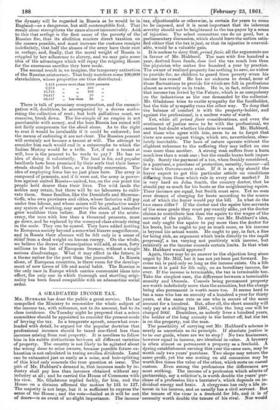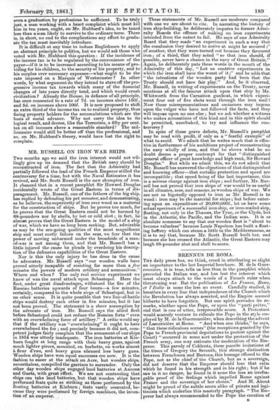A GRADUATED INCOME TAX.
Mu. HUBBARD has done the public a great service. He has compelled the Ministry to reconsider the whole subject of the income tax, with reference, not to its amount, but to its class incidence. On Tuesday night he proposed that a select committee should be appointed to consider the present mode of levying the tax. In a temperate speech, somewhat over- loaded with detail, he argued for the popular doctrine that professional incomes should be taxed one-third less than incomes arising from. real property. It is needless to follow him in his subtle distinctions between all different varieties of property. The country is not likely to be agitated about the wrong done to mine owners, because possible future ex- haustion is not calculated in taxing swollen dividends. Land can be exhausted just as easily as a mine, and hair-splitting of this kind only conceals the true question at issue. The pith of Mr. Hubbard's demand is, that incomes made by in- dustry shall pay less than incomes obtained without any industry at all ; and he carried the House of Commons with his view. Mr. Gladstone replied feebly, for him, and the House on a division affirmed the motion by 131 to 127. The majority is not large, but it is sufficient to express the sense of the House ; and the vote—hailed as it will be out of doors—is an event of no slight importance. The income tax, objectionable or otherwise, is certain for years to come to be imposed, and it is most important that its inherent severity should not be heightened to the tax-payer by a sense of injustice. The select committee can do no good, but a parliamentary discussion, which should leave the nation satis- fied either that the tax is just, or that its injustice is unavoid- able, would be a valuable gain.
It is useless to deny that, prima facie, all the arguments are in favour of Mr. Hubbard. The man with five hundred a year, derived from funds, does feel the tax much less than the physician who makes five hundred a year by practice. The owner of realized property has nothing to save, no widow to provide for, no children to guard from poverty when his income has ceased He has no sickness to dread, none of those fluctuations to provide for which are felt in professions almost as severely as in trade. He is, in fact, relieved from that income tax levied by the Future, which is as compulsory on the industrious as the one demanded by the collector. Mr. Gladstone tries to excite sympathy for the fundholder, but the tide of sympathy runs the other way. To deny that the balance of comfort is with the property-holder, and against the professional, is a useless waste of words. Yet, while all prima facie consideration, and even the sentiment of justice seem to be with the professional, we cannot but doubt whether his claim is sound. Mr. Hubbard, and those who agree with him, seem to us to forget that there are some unjust things, which are, nevertheless, abso- lutely inevitable. The laws of nature operate without the slightest reference to the suffering they may inflict on one man more than another. A strong man suffers from a burn much less than a weak one ; but the candle burns both impar- tially. Surely the payment of a tax, when frankly considered, is a purchase, a purchase of protection, security, honour—all for which Governments exist. If it is so, why should the buyer expect to get this particular article on conditions differing from those which rule in every other market It is very hard On John Smith, the country doctor, that he should pay as much for his boots as the neighbouring squire. Their incomes are equal, but Smith must save. Yet no man ever dreamt of charging for boots according to the source out of which the buyer would pay the bill. In what do the two cases differ ? If the doctor and the squire hire servants of the same grade they must pay exactly alike, yet the doctor claims*, contribute less than the squire to the wages of the servants of the public. To carry out Mr. Hubbard's idea, not only ought the squire to pay more than the doctor for his boots, but he ought to pay as much more, as his income is beyond his actual wants. Be ought to pay, in fact, a fine for being rich, an argument which leads directly to the imp& progressif; a tax varying not positively with income, but relatively as the income exceeds certain limits. Is that what Mr. Hubbard would approve ? Again, there may be an answer to the objection long since urged by Mr. Mill, but it has not yet been put forward. In- come tax is paid only so long as the income exists. On a life income it is paid for life only, on an hereditary income, for ever. If the income is terminable, the tax is terminable too. Take the simplest case, the difference between a terminable annuity and Oonsols. Consols being permanent property are worth indefinitely more than the annuities, but the charge being also permanent is worth more too. It seems hard to tax a man who has an annuity of a hundred a year for thirty years, at, the same rate as one who is secure of the same amount for a hundred. But, after all, the short annuity will only pay at a shilling tax 150/., while the long one will be charged 5001. Doubtless, as nobody lives a hundred years, the holder of the long annuity is the better off, but the tax is on the property, not the man. The possibility of carrying out Mr. Hubbard's scheme is nearly as uncertain as its principle. If absolute justice is to be our guide, where are we to atop? No two businesses, however equal in income, are identical in value. A brewery is often almost as' permanent a property as a freehold. A dyeing establishment earning this year the same sum, may be worth only two years' purchase. Two shops may return the same profit, yet the one resting on old connexion may be worth five times the value of the other, which rests on casual custom. Even among the professions the differences are most striking. The income of a profession which admits of partnership, say a solicitor's, is worth double the years' pur- chase of a profession like a barrister's, which depends on in- dividual energy and brain. A clergyman has only a life in- terest in his income, and so usually has a civil servant. But the tenure of the vicar is a freehold for life, and it is of necessity worth double the tenure of his rival. Nor would even a graduation by professions be sufficient. To be truly just, a man working with a heart complaint which must kill him in ten years, ought, on Mr. Hubbard's idea, to be taxed less than a man likely to survive to the ordinary term. There is, in short, no end to the complications any effort to gradu- ate the tax must inevitably introduce. It is difficult at any time to induce Englishmen to apply an abstract principle to politics, but we would ask those who voted with Mr. Hulzbard this question : If the incidence of the income tax is to be regulated by the convenience of the payer—if it is to be increased according to his means of pro- viding for his children, to the security of his property, and to his surplus over necessary expenses—what ought to be the rate imposed on a Marquis of Westminster ? In other words, by what argument do they intend to stave off the pro- gressive income tax towards which many of the financial changes of late years directly tend, and which would crush civilization ? Already the House, in defiance of all principle, has once consented to a rate of 7d. on incomes above 1501., and 5d. on incomes above 1001. It is now proposed to shift an extra third of the income tax on to realized property, thus fining property holders for the accumulations which are the basis of social advance. Why not carry the idea to its logical result, and decree, like the Terrorists, a fifty per cent. tax on all incomes above a reasonable standard ! The mil- lionnaire would still be better off than the professional, and so, on Mr. Hubbard's theory, would have lost the right to complain.































 Previous page
Previous page